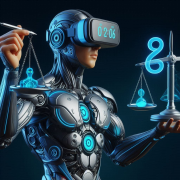As virtual reality (VR) technology advances, it finds applications in a growing number of fields, from entertainment and education to enterprise solutions. But with these developments come critical security concerns, especially around protecting sensitive data and intellectual property. For VR service providers, safeguarding information during collaborative projects is paramount. In this blog, we explore VR’s top security challenges and how leading platforms like Unreal Engine, Unity, and SimLab address these concerns to provide secure environments.
Key Security Challenges in VR
- Data Sensitivity: VR projects often involve proprietary designs, user data, and intellectual property. Ensuring confidentiality is crucial, especially when working with multiple stakeholders.
- Collaboration Risks: Collaborative VR projects increase the risk of data breaches. Secure access management is necessary to prevent unauthorized exposure of sensitive information.
- Cybersecurity Threats: As VR integrates with online platforms, it faces hacking, phishing, and malware attacks. Reliable cybersecurity protocols are vital to protect against these threats.

Solutions for Enhanced Security
Fortunately, there are effective strategies and tools available to mitigate these security risks, ensuring that sensitive data is protected throughout the VR development process.
- Unreal Engine’s Security Features:
Unreal Engine offers a range of built-in security features designed to protect data and intellectual property. The platform supports advanced encryption protocols that safeguard data both at rest and in transit. Additionally, Unreal Engine provides user authentication options, ensuring that only authorized personnel have access to sensitive project files. With role-based access controls, teams can manage permissions effectively, limiting exposure to sensitive information. - Unity’s Robust Security Measures:
Unity also prioritizes security, implementing best practices for data protection. The platform utilizes secure APIs and offers various options for user authentication and authorization. Unity’s asset management system enables developers to control access to specific assets and ensure that sensitive data is only shared with trusted collaborators. Furthermore, Unity’s regular updates and patches help address emerging security threats, maintaining a secure environment for development. - SimLab’s Secure Content Sharing and Control:
SimLab enhances data security through the unique SIM and ZIM project formats, which are accessible exclusively within SimLab VR Studio and SimLab Composer. These formats keep original project files secure, allowing creators to retain full ownership over their data. Creators can choose to share complete project folders manually through third-party tools. However, they can securely distribute the VR experiences via the free VR Viewer without giving full access to sensitive project assets. This setup ensures that only the VR experience itself is accessible to end users or clients for collaboration, while creators maintain strict control over their intellectual property and project data, preventing unauthorized access.

Conclusion
As VR technology becomes more integral to various industries, addressing security concerns is essential for service providers. By leveraging the security features offered by platforms like Unreal Engine, Unity, and SimLab, VR service providers can safeguard sensitive data and intellectual property during collaborative projects. As the landscape continues to evolve, prioritizing security will be vital in fostering trust and ensuring the successful implementation of VR solutions.
References
- Unreal Engine – Security Best Practices – Cyrex
- Unity’s Protection Policies For Its Creators | Unity Security
- How to protect your VR product and prevent Copyright infringement. • SimLab Soft Blog
-

1 What’s Next for VR Providers? Future Trends and Innovations
-

2 Scaling VR Solutions for Large and Small Companies: A Strategic Approach
-

3 Talent Retention and High Turnover: Building Sustainable Teams in the VR Industry
-

4 Integration with Existing Tools: A Seamless Workflow for VR Service Providers
-

5 Content Creation Struggles: Balancing Quality and Time in VR/AR Projects
-

6 Speed and Efficiency: Overcoming Challenges as a VR/AR Service Provider
-

7 Bought VR Headsets for Your School… and Now They’re Collecting Dust?
-

8 How to Choose the Best VR Solutions for Universities: A Comprehensive Guide
-

9 Fast, Affordable Custom VR Experiences – Pay Only if You’re Satisfied!
-

10 Looking for VR Creators for Our SimLab VR Store

